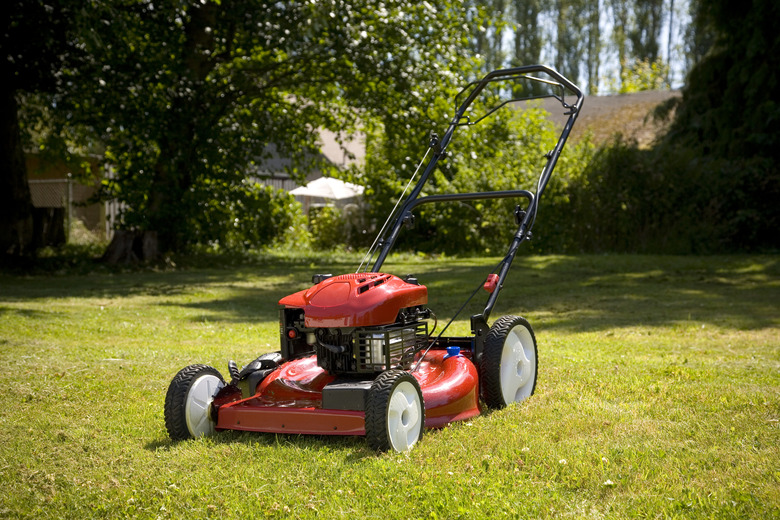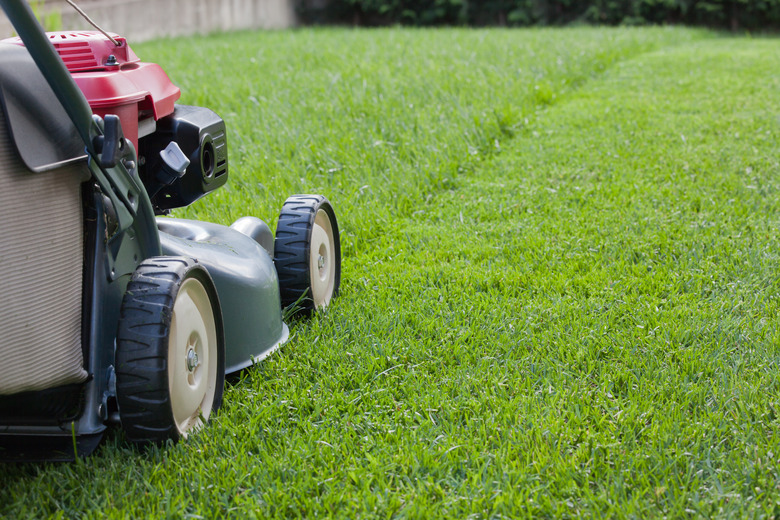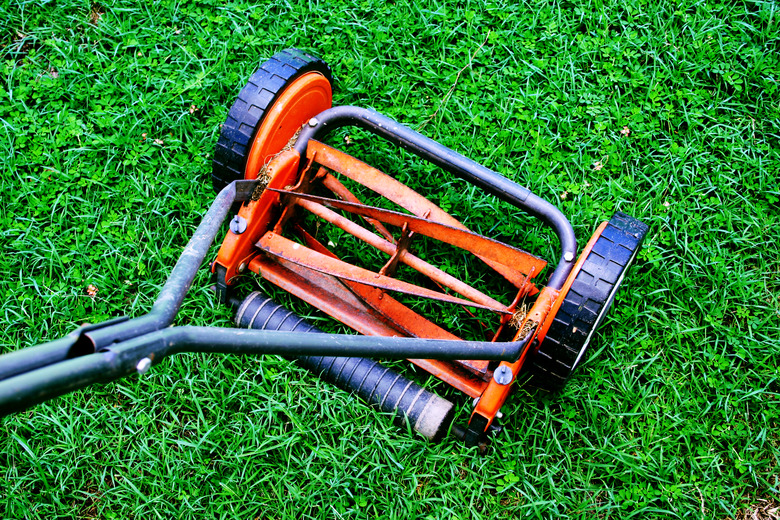Should You Get An Electric Or A Gas Lawn Mower?
We may receive a commission on purchases made from links.
Some fine spring morning, you may decide that you've had it with your gas lawn mower's tendency to start sluggishly if at all after its winter hibernation and begin to seriously consider the benefits of electric lawn mowers. These days, most people opt for the convenience of battery power when choosing electric tools, and although they have been a long time coming, cordless lawn mowers have finally emerged as a competitive and realistic alternative to corded and gas lawn mowers. A new lawn mower is a major investment, though, so you should take some time to decide whether replacing your gas mower with a corded or cordless model is really worth the dent it's going to make in your pocketbook.
Besides cost, the decision involves a number of variables, including lawn size and the type of terrain you have to mow, maneuverability, noise level and, for conscientious citizens of a warming planet, the all-important ecological concerns involved with mowing. You also want a mower that helps you maintain the lawn in the best possible way. You might be surprised to find that despite all the advances in cordless technology, keeping your old gas mower or purchasing a new one may be your best bet. On the other hand, you may not find that at all.
Tip
Electric lawn mowers aren't necessarily more eco-friendly than gas mowers, and they are definitely less powerful, but they're a lot quieter and easier to handle. If you have a small, flat lawn for which a gas mower is overkill, an electric mower makes a lot of sense.
Can Electric Lawn Mowers Do the Job?
Can Electric Lawn Mowers Do the Job?
Perhaps the most important consideration is whether an electric lawn mower has what it takes to handle your lawn. That chooga-chooga sound that gas lawn mowers make is the sound of cutting power — between 4.5 and 8.75 ft-lb. of it every second. By contrast, 1,000-watt electric lawn mowers typically develop about 2.5 ft-lb. of power, which is about a third as much. If you have rocky or uneven terrain or you're in the habit of mowing only when the lawn starts to look like a field — or when it's wet — you're going to find an electric mower seriously lacking in mojo.
Lawn size is also an issue. Gas lawn mowers have no problem mowing up to 14,000 square feet on a single tank of gas, and all you have to do is have extra gas and oil on hand to mow even larger expanses. Corded mowers are restricted by the length of extension cords (50 to 100 feet) and cordless mowers by the battery charge. You can increase the run time of a cordless mower by charging an extra battery while you're working, but without an expensive backup battery or an extra extension cord, the maximum realistic capacity for electric mowers is about 1,500 square feet.
Bottom line: In terms of power, runtime and capacity, gas lawn mowers win. Electric lawn mowers are fine for manicuring a small yard or even a medium-size lawn area, but they won't cut it if you have a large lawn or heavy-duty mowing to do.
Are Electric Lawn Mowers Eco-Friendly?
Are Electric Lawn Mowers Eco-Friendly?
As the effects of climate change become more obvious, it's natural to keep an eye on fossil fuel usage, and since electric mowers don't use gas, they appeal to those who are ecologically conscious. As far as corded mowers are concerned, however, environmental friendliness is a function of who supplies your electricity.
Putting aside the natural resources needed to produce solar panels and wind turbines, a home that gets the bulk of its energy from renewable resources may be able to claim carbon neutrality, but that's not most homes. Some energy supplied by power companies may come from renewable sources, but a non-negligible portion comes from burning significantly more fossil fuel than the gallon of gas your lawn mower uses.
It takes fewer kilowatt hours to charge a battery for a cordless lawn mower than it does to operate a corded one, but most contemporary batteries use lithium, and mining lithium is an energy-intensive process that uses vast amounts of precious water. So, you have to add the costs of lithium production to the costs of charging the batteries, and keep in mind that once lithium cathodes degrade, they can't be recycled. Again, the economic and environmental impacts of burning a gallon of gas compare favorably to those of producing and charging lithium-ion batteries.
Bottom line: Electric lawn mowers don't provide significant energy savings, but they do produce zero emissions in the immediate vicinity of the lawn mower. This is an advantage over a gas lawn mower, even a contemporary one with sophisticated emission-control mechanisms. However, the power plants that produce the electricity on which electric mowers operate are not emissions-free, so the boost to your eco-consciousness ego is imaginary unless you produce your own renewable energy.
Which Mower Is Easier to Use?
Which Mower Is Easier to Use?
A typical walk-behind gas lawn mower weighs between 90 and 100 pounds, and that can be a lot of weight to handle when you're making U-turns or negotiating curves. By contrast, the Greenworks 14-inch, 9-amp corded lawn mower, which is widely recognized as one of the best, weighs only 33 pounds, and the Greenworks 14-inch, 40-volt cordless mower, which is just as highly regarded, weighs about the same.
Gas-powered lawn mowers may be heavier, but many of them are self-propelled, and many are capable of adjusting to your walking speed. That doesn't help, however, when it's time to push your mower into a tight space in the garage or lift it into a truck.
Bottom line: The advantage in maneuverability generally belongs to electric lawn mowers, but self-propelled gas mowers are close behind. If you choose a corded model, remember that keeping the cord out of your way can make the mowing job more complicated.
Which Mower Is More Cost Effective?
Which Mower Is More Cost Effective?
If you're going to buy a new lawn mower (and not a used one listed on Craigslist), you're going to spend more for a gas-powered model than for an electric lawn mower, and that's partly because gas mowers come with more features. For example, the bulk of gas mowers on the market are self-propelled, which is a feature you're sure to want if you have a large lawn or if you have to cut grass on a slope, and most have electric starters, which makes them as easy to get going as electric mowers. The minimum cost for a gas mower with these features is about $350, but if you add mulching capability, the price can double.
You can pay over $600 for a cordless electric mower with mulching capability, but the average price for cordless and corded models is more like $250. If you have a very small yard, you can purchase an 18-volt Ryobi mower that uses the same battery and charger as the rest of your Ryobi cordless tools for $170. The only way to spend less than this on a new lawn mower is to purchase a manual reel-type mower. Unsurprisingly, Greenworks also makes the best manual mower, and it costs less than $120.
Bottom line: Gas-powered lawn mowers are more expensive, but they come with more features.
Which Mower Is Easiest to Maintain?
Which Mower Is Easiest to Maintain?
You might have started shopping for an electric lawn mower because you were tired of maintaining your gas-powered one. You have to change spark plugs regularly, and every time you add gas, you also have to add oil, or you risk burning out the engine. At the end of the season, it's important to empty the gas tank (or add fuel stabilizer) to avoid fouling the carburetor, which could get fouled anyway if the summer weather is unusually wet. On top of that, there are electrical connections to maintain, gears to lubricate and cables to tighten.
Needless to say, you don't have to worry about any of this if you own an electric lawn mower. Just plug it in or insert a fully charged battery and you're good to go. Of course, you have to periodically sharpen the blade and clean the undercarriage to keep your mower in tip-top shape, but you have to do this with a gas-powered mower too.
Bottom line: Compared to gas-powered lawn mowers, electric mowers are virtually maintenance-free. Your corded or cordless mower will start up in spring every time no matter how long it has been sitting.
Which Mower Is More Neighbor-Friendly?
Which Mower Is More Neighbor-Friendly?
Unless you live on a multiacre estate, in the middle of the forest or on a deserted island, you have neighbors who can hear your lawn mower, and they are bound to appreciate the relatively quiet hum of an electric lawn mower more than the chooga-chooga of a gas-powered one. A study by the Acoustical Society of America found a direct link between noise level and cutting ability, so the more powerful your gas-powered lawn mower, the more likely it is to wake up the neighbors.
The typical decibel level of gas lawn mowers is between 95 and 100 dB, while that of electric lawn mowers is more like 75 dB. That doesn't sound like much, but considering that a noise level of 100 dB is eight times louder than a level of 70 dB, it's actually pretty significant. If you like to cut the grass early in the morning, you'll be more popular with the neighbors if you use an electric lawn mower.
Another reason an electric lawn mower is more likely to score you points with the neighbors is that it doesn't spew stinky fumes into the atmosphere. This doesn't make an electric mower emission-free, but it does make it easier for people to enjoy the smell of cut grass.
Bottom line: Electric lawn mowers are several times quieter than gas lawn mowers and are easier on the neighbors' ears. They are also free of smelly carbon emissions.
The Push Mower Alternative
The Push Mower Alternative
Do you have a small yard and mow the grass frequently, and do you want to save money, please the neighbors and be truly ecological? Get a reel-type push mower. You'll probably attract attention because the sight of someone mowing with a push mower is now rare. There are some good reasons for hearkening back to simpler times with your choice of lawn mowers:
- Unlike a gas mower or a corded or cordless electric mower, a push mower requires no more energy from the environment than that required to manufacture it and whatever you put into it yourself, and it is truly emissions-free (although this doesn't necessarily apply to the operator).
- A reel-type mower is better for the grass than a rotary mower. Instead of shearing off the tops of the grass blades, it slices the blades cleanly. The grass heals quicker and looks better.
- Manual push mowers are quiet. Mow whenever you like and the neighbors will never know.
- Reel-style push mowers require little maintenance other than periodic lubrication and blade sharpening. They can last virtually forever.
Don't even think of getting a push mower if you mow infrequently and let the grass get long, if you have rocky terrain or if you have a very large yard. There's a reason for power tools.
References
- Garden Beast: Electric vs Gas Lawn Mowers: Which is Best?
- Bob Vila: What's the Difference? Gas vs. Electric Lawn Mowers
- Wired: The Spiraling Environmental Cost of Our Lithium Battery Addiction
- Mean Green Mowers: Shhh! Turn Down the Volume with Low-Noise Mowers
- Healthy Handyman: Electric Vs Gas Lawn Mower: Which One to Choose?
- 20 Something Finance: 5 Reasons to Switch to a Reel Mower


